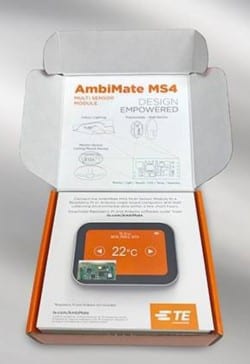TE Connectivity announced general availability of AmbiMate MS4 sensor module development kits. The kits allow global engineering and development teams to build prototypes and evaluation boards for systems incorporating TE's state-of-the-art AmbiMate MS4 Series sensor modules.
Applications are expected to include indoor lighting, building automation, connected home, air quality, energy management, work space comfort, zonal environmental controls, and so on.
"We are seeing lighting and building controls companies around the world moving quickly to incorporate sensors into their systems," said Jonathan Catchpole, system architect with TE Connectivity's Industrial Solutions group.
"In fact, that is why we developed the AmbiMate platform - to allow our customers to incorporate as many as seven smart sensors on one small PCB assembly," Catchpole continued.
TE's AmbiMate sensor module MS4 series provides an application specific set of sensors on a ready to attach PCB assembly for easy integration into a host product. Design resources are freed and time to market accelerated by integrating the MS4 series pre-engineered, four core sensor solution for Motion / Light / Temperature / Humidity into your next product.
These sensor modules support multiple sensor technologies including:
- Four Core Sense Capability
- Motion (PIR)
- Light
- Temperature
- Humidity
- Optional Sense Capability
- VOC
- CO2
- Sound (microphone)
Other MS4 series sensor modules include VOC (Volatile Organic Compound), CO2 and sound detection. Add the capability to monitor air quality through the capture of VOC concentrations. Select an MS4 series with a microphone to augment motion detection or to listen for sound events.
All MS4 series sensor modules offer the flexibility of sharing a common seven position connection. This allows the designer to layout a single PCB footprint accommodating all the available sensor configurations at production.
"What we have added now is the verified, quality software code and the few necessary parts needed to take the sensor module and almost instantly, with either Arduino or Raspberry Pi, start reading the sensor data. This allows our customers to start exploring the potential of the AmbiMate device and everything it can bring to your system design and overall system capability," added Catchpole.
Multi-sensor modules benefits:
- Design resources are freed and time to market is accelerated
- Simplicity of popular I2C communication protocol
- Space saving compact design
- Multiple attach methods to accommodate your application need
- One footprint allows multiple sensor configurations & flexibility in design







